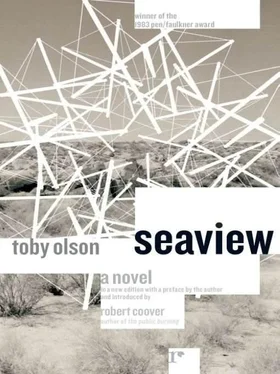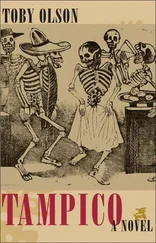She sat for a little while longer, and then she swung her leg down, off the seat and turned in it and opened the door and got out of the car. She walked around the car and went to the tent, where he had told her, with that smile of his, she could also sit if she felt like it. It was not that she felt like it, but that she wanted to feel this last limitation to see if it would be like she thought it would be. She got in the tent and sat down in the cramped space. The canvas was catching the sun that had come through the clouds, diffusing it, and there was a golden glow inside the tent. She couldn’t sit straight up without hitting her head on the top, and she sat hunched over. She could feel just how foolish it was to sit there, and she thought he would think she would try it in the way she was doing now, but that he would think she would feel some pleasure when she did it. It did feel nice, in its way; the light was fine, but what she felt had nothing to do with rules. She sighed, then opened up the flap of the tent, pushing the slit open. She pushed up from her haunches and crawled out through the slit, head first, turning her shoulders slightly, and got to her feet and stretched her body.
She went back to the trunk of the car, opened it, and got her suitcase out of it. It was a small canvas case and very light, and she lifted it easily. She didn’t close the trunk. Then she went back to the passenger side of the car, put her suitcase on the ground, and got in. She reached up to the rearview mirror and took hold of the medallion that hung down on its thick chain and slipped the chain from around the mirror, taking the medallion down. It was the one he usually wore, but it belonged to her. She held it in the palm of her hand and jiggled it. It was heavy and solid, and she could feel the embossed complex of rods and wires with her fingers. Then she took the chain in both hands and slipped her head through the opening, putting the medallion on.
She got out of the car and picked up her suitcase from the ground. As she bent to lift it, the medallion swung slowly at the end of its chain. When she rose up, she heard the two sharp notes of a bobwhite. They came from the hillside to her right and were very loud; she could tell the bird was close. They seemed to cut through what overcast was left and be part of the quality of the coming sunlight. She turned away then, from the direction of the sea, and leaving the tent and the campground, she began her walk to the highway.
RICHARD WAS NO MORE THAN A HUNDRED YARDS FROM the tower when he saw Allen materialize in the dark, vacant space of the cutstone opening that was the doorway. He was a little away from cover and at a level with the base of the tower, and when Allen stopped in the frame, a golf club in one hand across his chest, a fat bulge in the bottom of his left pocket, Richard thought he was looking directly at him and had an urge to jerk the gun from his belt, raise it, and fire. But then Allen was gone, having turned out of the opening, moving quickly to his right and trotting into the pines behind the tower. In a moment, Richard could no longer see him. He stood in his tracks, felt he wanted to enter the dark doorway, made his decision quickly, and started to run toward the tower. When he got to it, he cut around it as Allen had done and started after him. The growth was thick, and there was some sunlight in it, but he knew nothing about tracking and could not read signs, so he guessed at the direction Allen had taken, and moving in a slight crouch, though it was not necessary — the pine growth was higher than a man — he stayed on his level on the ridge and headed in the direction of the sea.
It took Richard no more than ten minutes to get there, but that was enough time for the sweat to have risen out of him. What he had thought was a trail had petered out, and he had to struggle through heavy growth that cut at his arms and tore his clothing in places. His gun kept slipping down into his pants at his belt, and he had to stop often to adjust it. Once he tried to put it in his pocket, but his pockets were small slits and he couldn’t get it in. He tried carrying it in his hand, but that was no good either; he needed both hands free to push the brush away before him. Finally, he came to the edge of the cliff.
He was half way over it before he knew he was there. The pines ran right up to it, he was a little dizzy from the pace and work of his movement, and he stepped over the edge. It was only reflex that made him grab at the pines. He went over, but he had a hold on a thick branch, and he jerked himself back from the edge and stood still on the lip, breathing heavily and trying to listen. There were birds singing, and there was the heavy sound of the breakers coming in, and there was no possibility of hearing anything else, so he stood still and waited until his breath could return to normal. The beach was empty. He was standing above a small inlet, and he could not see very far to his left or right. He picked pine needles from his shirt fabric and from his hair and pants. The beach and the sea below him were beautiful in their emptiness and solitude and unconcern, but he was not moved by them. When he had his clothes adjusted, the gun set firm in his belt, he began to work his way to the left along the edge of the cliff.
He had gone no more than thirty yards when the growth around him began to thin out. The cliff sloped down slightly, then up again in the distance, and at the place where it crested the growth got high and heavy. He saw that to his right the escarpment running down to the beach was more gradual in pitch than where he had almost fallen over, and he moved to the edge and stepped over it, getting himself below the lip so that he would have some cover as he moved on to the next crest. He worked his way along below the edge, and when he got to the higher pines, where the cliff steepened sharply again, he came back over the lip. He entered the pines and stopped and listened again. He could hear something quite close to him at the cliff’s edge. He could not identify the sound, but he knew it was Allen. He edged as quietly as he could through the thick stand of pine, and before he got to the edge of the cliff, he saw him.
There was an open place, a kind of sea perch, at the cliff’s edge. It was surrounded by heavy growth, and there was a path at the back of it that headed into the golf course. The area was a rough rectangle, about twenty-five-feet long. Allen was standing at the far end of the rectangle, away from Richard and facing him. The Golden Rams were on the ground in front of him, and he was standing over them with the golf club in his hands. He chipped one ball and then another, hitting them cleanly and with sharp little clicks, sending them in the air, about a foot off the ground, ten feet down the rectangle. Then he went and got the balls, brought them back, and chipped them again.
Richard watched him and began to fear him. The thing he was doing was very odd. It was outside of Richard’s previous experience of what odd might be, and he felt that he wanted to understand what was going on. Was he waiting for him, biding his time in this way with his golf? It didn’t look like it; there was something more serious about the way he hit the balls, something very concentrated, contained, and in no way casual, and there was such obvious skill in it that Richard felt fear in knowing that he had no skill that could be compared to it. Then he began to like the feel of the fear he had, and when Allen walked back after chipping the balls for a third time, Richard stepped out from the pine cover and entered the open space. He did it as quietly, but as quickly, as he could, and Allen heard him and turned around and faced him, dropping the Rams on the ground.
They stood at opposite ends of the enclosed rectangle. They were alone together in a peaceful place, and yet it did not seem so peaceful: the clouds were moving and changing; there was light action in the sky, and the shadows kept altering their shapes between them. They could hear the surf rushing, and they caught glints from the sun hitting into the swells in the corners of their eyes. They both felt a need to speak or do something at least that would join them to the action of sky, ground, and sea, some kind of activity, some committed entrance to the changing world. Had they spoken out, casually, they would have brought up talk that was directed into the fixtures of the past, their time together in that solid place; they would have spoken, sentimentally, about life directions, or shared musical taste, or women, or the touchstones of common events. They knew enough of where they were to know that the talk could not be of the future and felt the hollows in their stomachs in knowing, finally, that it was indeterminate; useless to speak of it, a foolish enterprise. And what of this present, Allen thought, how escape from that?
Читать дальше












